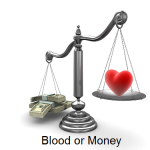The reasons are not so clear at first glance, yet both are a buy-sell cycle.
In both cases there is a buyer and a seller. The economic impact is similar, whether you are choosing to go to college or to hire a new employee. Comparing time lines, the evaluation of “which college” or “which person” is likely weeks or months, not days.
 And as the buyer gets near the final decision, risks and doubts begin to rise, “is this the right college for me”, or “is this the right employee for the job”.
And as the buyer gets near the final decision, risks and doubts begin to rise, “is this the right college for me”, or “is this the right employee for the job”.
The difference, going to school, you were the buyer. Coming out of school going to look for a job, you are now the “seller“.
By understanding how an individual decides to attend which college, we can use street-smarts to line this up with how a manager makes the decision to hire a new employee. Using this information to help us resonate better as we move in and out of the hiring process, rising to the top of the pile of applicants who all want the job.
Many ask us, “Do I really need to resonate with the person across the table during an interview”, the short answer is yes, if you want to land a decent job.
As Individuals, We Make Buying Decisions Based on what “We Need”.
Think back to when you or somebody you know recently decided on going to college. Did they run off to the 1st college and drop a boat load of money on the door step and show up the next day for class? Odds are no. They started with discovery, scoping out their needs:
- What skills and capabilities will help me long term for my career?
- Is this the right degree to apply for at school?
- What additional skill sets do I want to get out of college?
- Is this the right location for me?
- Do I really want to spend years of my life doing this?
- How much money might this cost me long term?
There is an old saying, “In sales and marketing, to succeed, place yourself in the shoes of the buyer“.
Take a look at the list of items of a person trying to decide if college is the right choice, a high level view of “the why, what and where”. Now think about a person trying to decide on hiring a new employee and the discovery phase of the hiring process. The similarities are close in almost every case.
By reviewing how a person decides to attend college, you are already aligning your thoughts with how a hiring manager goes about deciding to open up a position to fill and hire somebody.
We may not be part of the actual discovery phase which has occurred when a new position is posted. However, this does not mean we can’t ask questions to clarify and understand better what are the true needs on the table as a manager decides to hire a new employee. Understanding and discussing their needs during the hiring process will help you connect and stand out from the noise of the crowd chasing the position.
Once our needs are defined clearly and we’ve decided college is the right choice, we move into the evaluation phase, “the details of what, how and when”.
- How is the college ranked by chosen degree?
- What are the minimum requirements to apply?
- When do I want to start classes?
- What is my overall budget and how do I fund my college education?
- How would it feel to attend and live on campus or near the school.
- How much money am I willing to spend?
In the evaluation phase of the hiring process, the hiring manager begins to seek out and review potential candidates who match up to their list of capabilities, (some required, some optional), around the position they desire to fill. They are moving towards setting up interviews with their 1st round of candidates based on the details around “the what, how and when”.
Specific examples during the hiring process include requirements of degree, years of experience, salary range, and location of job. Optional skill sets in various disciplines may include work habits, computer skills, written and speaking skills.
As the Decision to Which School to Attend Looms Closer, “Logic and Value Rides in on the Horse of Emotion”.
Because we make emotional decisions and justify them with logic. Think back to the college you or a friend attended. What reasons were given in public?
 Now, looking in the mirror, what were the real reasons?
Now, looking in the mirror, what were the real reasons?
Common ones we’ve heard:
- “The place felt right”
- “The views were beautiful”
- “The place vibrated with energy”.
More times then not, we make decisions with both our heart and our minds. We refer to this mixture of emotion and logic during decision making as “Blood or Money”.
During commitment, risks begin to rise as the individual is preparing to make a buying decision.
Stop and think about all the things you would need to have in place before you make a final decision on which college to attend? Now consider during the final round of interviews prior to hiring a new employee what the person on the other side of the table is considering?
 Prior to making an offer to hire, the hiring manager, (the buyer), is reviewing all of the potential capabilities and skill sets of the final individuals.
Prior to making an offer to hire, the hiring manager, (the buyer), is reviewing all of the potential capabilities and skill sets of the final individuals.
Some of the hiring persons open questions at this time are:
- Who will be able to handle the requirements of the job?
- Who can fill the open position the best?
- Who provides the least amount of risks as a new employee?
- Who is looking for a career, or is this just a stepping stone for their next job?
- What capabilities or skill sets are missing from which individuals?
By placing ourselves in the shoes of the hiring individuals, we are more capable of understanding how we should act during the hiring process.
Understanding all of the moving pieces of the hiring process allows individual applicants to stay in sync and resonate with those who will have an impact on who gets hired to fill the open position.
Remember, it is not only important to understand the “what” to do doing the hiring process to stay in sync. It is the use of street-smarts around the “how” to do it and “when” to do it which allows you to shine amongst the pack of applicants the hiring managers are reviewing.
